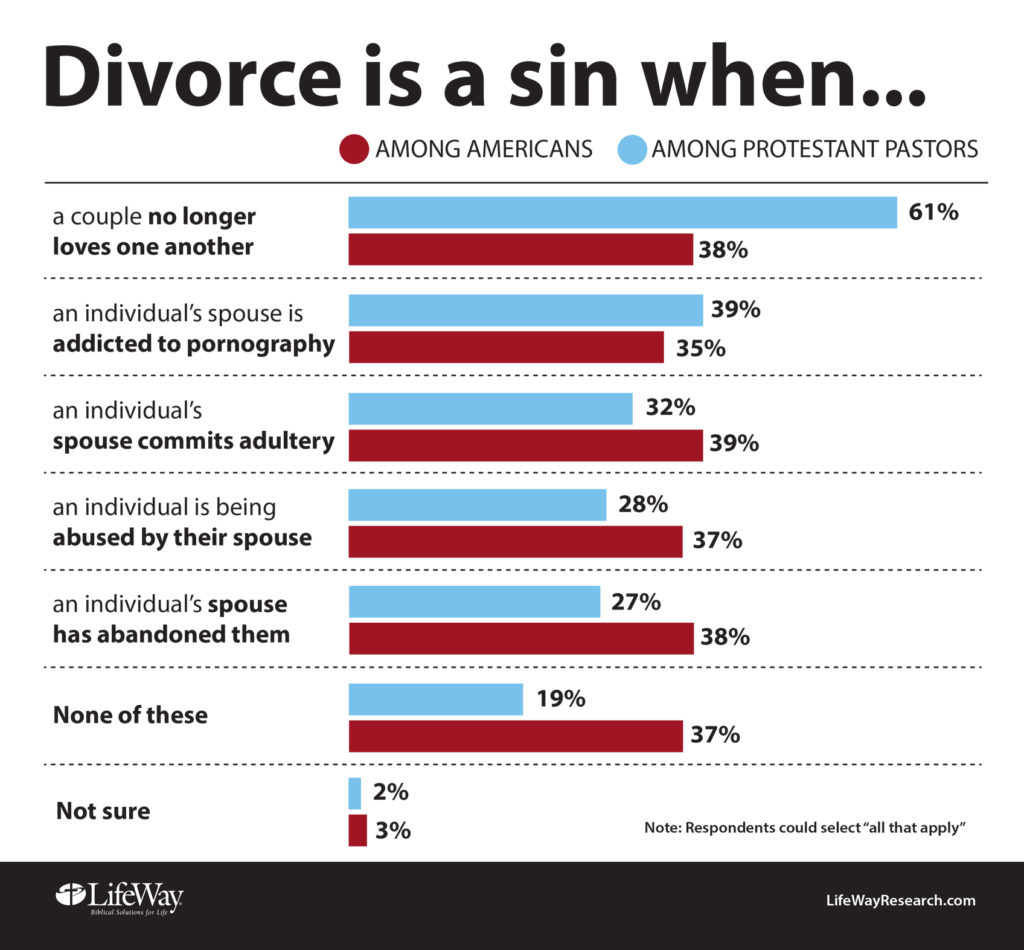by Aaron Earls
Pastors believe not all divorces are created equal, but for many Americans any reason is as good as another according to new research from Nashville-based Lifeway Research.
“Pastors make a distinction about the rightness of a divorce based on the reasons behind it,” says Scott McConnell, Lifeway Research vice president. “They want to account for the parts of Scripture that speak of possible rationales.”
However, Americans view virtually all reasons for ending a marriage in the same moral light.

“About one in seven Americans are saying divorce is a sin in all of these cases, more than a third don’t think any of these would be a sin, and almost half believe some circumstances would be sinful, but not others,” says McConnell.
In a separate phone survey of 1,000 Protestant pastors, less than a third want to classify as sinful an individual divorcing their spouse for adultery (32 percent), abuse (28 percent), or abandonment (27 percent).
Pastors are more likely to call divorce a sin when a couple divorces over a pornography addiction (39 percent), and because the spouses no longer love another (61 percent).
In their views on divorce, Protestant church members are much more closely aligned with the average American than with their pastor. Virtually the same percentage of Protestants believes a divorce is sinful when it is over adultery (44 percent) or an end to their feelings of love (46 percent).
Differences also exist between Americans from different regions of the country. Those in the Northeast and those in the predominately Protestant South are more likely to consider the various possibilities as sinful compared to those in the West. Westerners are the most likely to say none of the reasons would be a sin (51 percent).
Minorities are also frequently more likely to consider as a sin the particular reasons for a divorce. Hispanics are more likely than whites to say it is sinful to divorce when one spouse commits adultery—45 percent compared to 36 percent. African Americans are most likely to believe divorcing over abuse is a sin. Almost half (47 percent) say yes, compared to 36 percent of whites and 32 percent of Hispanics. Only a quarter (26 percent) of African Americans say none of the reasons given are a sin, compared to 40 percent of whites and 37 percent of Hispanics.
Pastors show similar racial differences. African American pastors are more likely than others to see as sin a divorce over adultery (52 percent), abuse (47 percent), and abandonment (44 percent).
Differences also exist between evangelical and mainline pastors. Evangelicals are more likely to believe a divorce based on the couple no longer loving each other is a sin—66 percent compared to 52 percent. They are also half as likely as Mainline pastors to say none of the possibilities is sinful. Only 14 percent of evangelical pastors say that versus 28 percent of Mainliners.
“While most Protestant pastors view the sinfulness of divorce differently based on the reason for the divorce, this sensitivity is lost on their members,” said McConnell.
Read more about the study at Lifeway Research.
AARON EARLS (@WardrobeDoor) is online editor of Facts & Trends.







